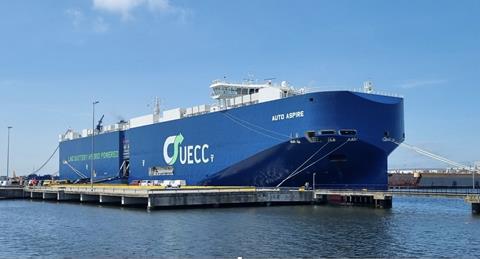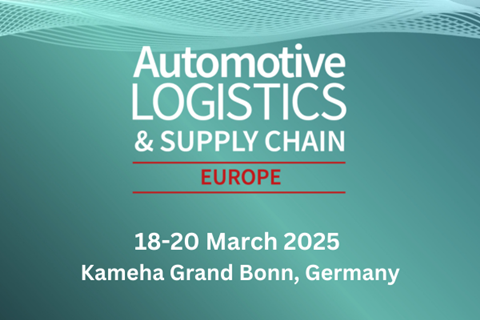[Updated January 9] JLR is helping advance its own emissions reduction goals by taking part in the Sail for Change fuel switch initiative for the maritime delivery of finished vehicles, which offers the option to switch to biofuel for short-sea shipments.
JLR is the latest carmaker to join UECC’s Sail for Change fuel switch initiative for the maritime delivery of finished vehicles, which offers the option to switch to biofuel for short-sea shipments. JLR is the fourth carmaker to join in with the programme, following Toyota, Ford and one other unnamed carmaker who joined in September last year.

UECC started offering carmakers the opportunity to use low-carbon liquefied biomethane (LBM) in maritime transport in July last year. The fuel is supplied by Titan Clean Fuels and is currently being bunkered on UECC’s five dual-fuel LNG Pure Car and Truck Carriers (PCTCs) operating in the European shortsea trade to provide direct and immediate cuts in emissions.
Sail for Change has now been extended into 2025 following a new supply deal with Titan to secure LBM supplies at the port of Zeebrugge for much of this year, according to UECC, resulting in an estimated reduction of over 75,000 tons of greenhouse gas (GHG) emissions.
“We’re delighted to have another valued customer onboard with Sail for Change,” said UECC’s energy and sustainability manager, Daniel Gent. “JLR has shown a strong interest in developing sustainable maritime transport solutions and this is a big step in that direction.”
JLR has its own goal to reduce emissions to net zero by 2039 through the decarbonisation of its manufacturing, operations and supply chain, as well as vehicle emission reductions. At the most recent conference of the Association of European Vehicle Logistics (ECG), held in Germany, Levent Yuksel, freight operations director at JLR outlined some of the measures the carmaker was taking, including the shift from diesel-powered trucks for inbound transport toward alternative fuels. At the conference Yuksel also pointed to the work its was doing with maritime shipping partners using biofuels on ro-ro vessels travelling between Zeebrugge and Norway, which was helping JLR toward its goal of carbon neutrality by 2039 and more immediate objectives of reducing emissions by 40% by 2030.
Yuksel confirmed that related to the participation in Sail for Change and said that JLR Industrial Operations is pleased to strengthen the collaboration. “As a remarkable step for sustainability ambitions of both organisations, this latest initiative is about utilising sustainable alternative fuels in jointly operated routes,” he told Automotive Logistics. ”Through this partnership, the aim is to achieve significant reductions in CO2e emissions. Within the ro-ro shipping sector, biofuels are essential for decarbonisation until more advanced sustainable technologies become available. This initiative with UECC will enhance our knowledge and experience in deploying sustainable fuels in shipping.”
Yuksel also led a workshop at last year’s Automotive Logistics and Supply Chain Europe conference with Anouck Arnaud, director of worldwide transport logistics, Mercedes-Benz Group, looking at the importance of partnerships between logistics providers, suppliers and OEMs to reduce emissions and improve sustainability across the automotive supply chain.

Levent Yuksel will join other carmakers and logistics leaders at this year’s Automotive Logistics and Supply Chain Europe conference in Bonn, Germany March 18-20 to discuss innovation and resilience, and how they are re-imagining the automotive supply chain to be more competitive, agile and sustainable. Learn more and register here
Emissions trading system
Carmakers are being pushed to cut carbon from inbound and outbound logistics by sea by the EU Emissions Trading System (EU ETS), which has resulted in increasing liabilities for polluting vessels. Since 2005 the EU ETS has required companies to pay for their GHG emissions. From January 1, 2025, shipping companies will have to pay for 40% of their emissions reported in 2024. In 2026 that will rise to 70% of emissions reported in 2025 and from 2027, shipping companies will have to pay for 100% of their emissions. Since January 1 this year, Fuel EU Maritime can now also impose costly penalties for failing to meet ever-tightening carbon intensity reduction targets.
“We know from our customers already engaged in Sail for Change that they see the LBM product as a competitive decarbonisation lever in their supply chains,” said UECC’s Gent. “We have seen customers increasing the scope (port pairs and volume of units) since joining and have strong interest for a long-term Sail for Change commitment into 2027.”
Gent added that the latest supply deal with Titan has given UECC a platform on which it can build a long-term commitment to alternative fuels, including LBM. The company can carry out carbon-neutral loading operations across its port network with verified emissions data available to clients through a CO2 registry.
Using LBM can increase the estimated 25% cut in emissions from using LNG while also cutting other harmful emissions of particulate matter, nitrogen oxide and sulphur oxide, according to UECC.
“This is reflected not only in the Scope 3 emission reductions being seen by our Sail for Change customers, but also by UECC as a whole when we look into the future with Fuel EU Maritime on the horizon,” said Gent.
Yuksel added that UECC’s history of implementing green solutions will foster a sustainability-focused relationship. ”This collaboration will enable a firm step in our commitment to supporting the journey towards achieving net-zero emissions,” he said. ”Over the coming periods, we will provide further details on our initiatives and partnerships within the pure car and truck carrier network, highlighting our collective efforts towards a sustainable future.”


























![Global[1]](https://d3n5uof8vony13.cloudfront.net/Pictures/web/a/d/s/global1_726550.svgz)













No comments yet